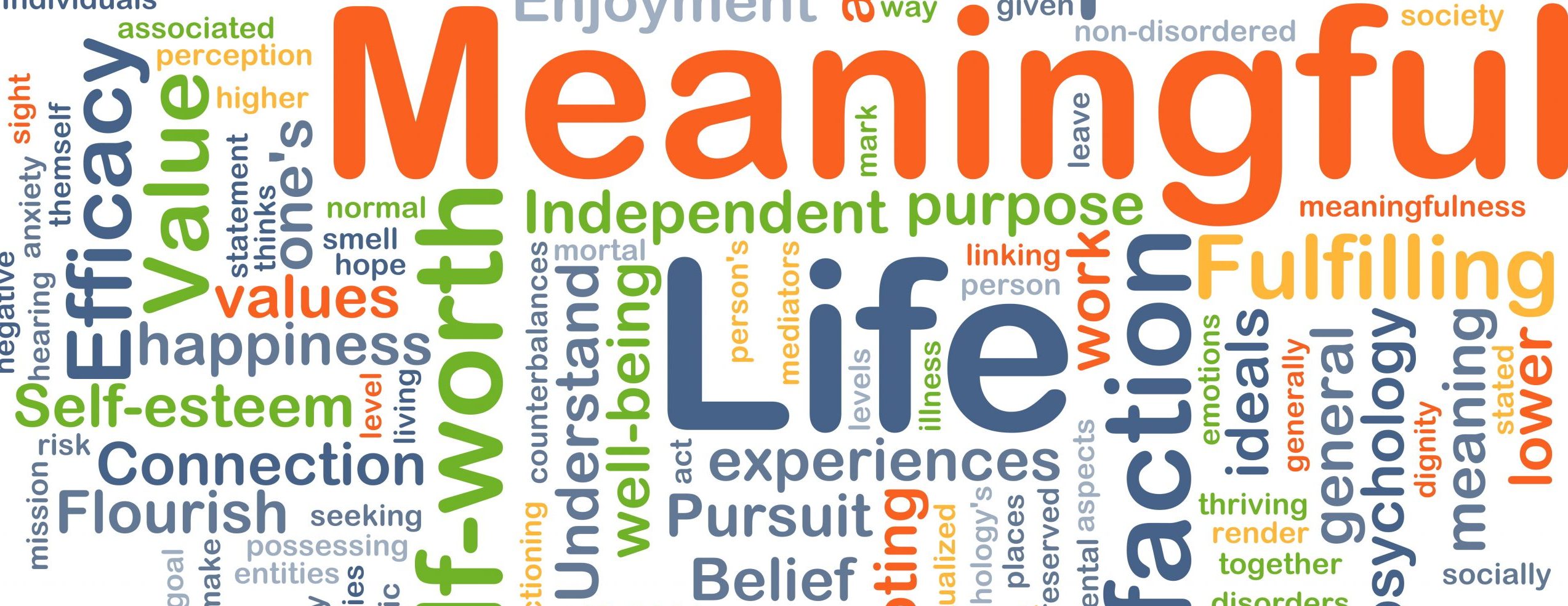Meaning In Life Is Critically Important To Well-Being. Entrepreneurship Is A Key Route To Get There.
Podcast Transcript: Clay Routledge (Professor of Psychology, North Dakota State University and Director, Existential Science Laboratory) and John Bitzan (Director of the Sheila and Robert Challey Institute For Global Innovation And Growth at North Dakota State University) discussing entrepreneurship and meaning in life on the Economics For Entrepreneurs podcast, August 25, 2020.
Listen to the full episode here.
Hunter Hastings:
Clay and John, welcome to Economics for Entrepreneurs.
John Bitzan:
Thanks for having us.
Clay Routledge:
Yeah, thanks.
Hunter Hastings:
Well, thank you both. You’ve given us a very uplifting subject today, which is the subject of meaning in life as it relates to capitalism and entrepreneurship. It’s something that you’ve studied and researched, and you’ve developed considerable expertise in it. So we’re looking forward to hearing from you. We always like to start with origin stories, John and Clay. So this is a podcast about entrepreneurial economics, but you’re not both economists, I don’t think. Clay, you’re a psychologist, I think.
Clay Routledge:
Yeah, that’s correct.
Hunter Hastings:
But you do focus some research on the study of entrepreneurship and innovation. So tell us your background and how you got to develop that particular focus.
Clay Routledge:
Yeah, that’s correct. My training is in psychology and specifically social psychology. So my background really is focused on human motivation, so what is it that inspires human to do the things that we do, what energizes our goals and our aspirations. And within that area, my specific area of expertise is in what’s called existential psychology, which is a pretty broad area, but it focuses on all sorts of questions that humans are uniquely positioned to ask, such as questions about the meaning of our life, why we’re here, what purpose we serve, what happens to us after we’re gone. So these kind of heavy philosophical questions. And what my research focuses on within that area is how those questions and related pursuits drive human behavior. And so you can kind of start to see hints as to why this might be important for economic variables and issues such as entrepreneurship because based on my work, there seems to be good reason to think that one of the major motives for our species is to live lives of meaning. We want to feel like we’re significant contributors to a meaningful world. And within that, we endeavor to do all sorts of things to make our mark, to have an impact on our families and our communities and a broader society.
And I see entrepreneurship as one specific domain within that. So that’s kind of the broad area of research that I’ve been doing for, not on entrepreneurship specifically, but just on meaning in life as a powerful human motive. I’ve been doing that work for over 15 years now. And my formal title is now Professor of Management at North Dakota State University in the Department of Management and Marketing. And I work with John, who will introduce himself shortly, at the Challey Institute.
Hunter Hastings:
Let’s have John introduce himself now. I read in your background, John, that you’re a business economist and a Professor of Management. And we know enough from our own E4E background with our professors that that can mean a lot of different things! So tell us about your work and how you connected with Clay on this intersection of psychology and economics.
John Bitzan:
I’m trained as an economist, not really a business economist, but an economist. And most of my research actually has been in the area of transportation economics. And if you’re familiar with the history of transportation in the United States, you know that the transportation industries were some of the most heavily regulated industries in the US until the 70s and early 80s. And so studying the problems in the industry and the huge improvements that have occurred with regulatory reform gave me a really good appreciation for the harm that can be caused by over-regulation. I also have taught courses in the College of Business in international business and international economics, and I think that it’s impossible to study global markets without noticing the huge role that economic freedom has played in elevating people out of poverty and making people’s lives better. And so a year ago, I got the chance to lead in an institute, the Challey Institute, that’s focused on looking for ways to unleash the power of the private sector to create economic opportunity. And so I jumped at the opportunity.
And since the institute was new – it included me and one administrative assistant – we needed to find a way to attract existing talent at NDSU to the Institute to start helping us do some of the research that we were interested in. And so we gave a small stipend to faculty that wanted to participate in our institute, and Clay was one of those faculty. And quickly, it became obvious to me that the stuff that Clay was working on was super interesting and very important as well and fit very well with the mission of the Challey Institute. And so Clay has been gracious enough to let me be involved in working on this new research with him. And so I’m along for the ride. He’s allowed me to come on for the ride, and I’m really excited about it.
Hunter Hastings:
We’re excited too to learn about this intersection of psychology and economics. We certainly believe in economics as action, and as entrepreneurial action specifically. On the producer side, we try to understand motivation because that’s a big part of what’s driving that action. So we’ve got a lot to learn from you. Let’s start at the beginning. And maybe, Clay, you want to start. I read the paper with the title Why Meaning Matters for Freedom and Flourishing. Please define meaning and how important it is for mental and physical wellbeing.
Clay Routledge:
Generally in the scholarly literature, meaning is defined as people’s perception of the coherence, significance, and purpose of their lives. What that means is at some basic level, all organisms are sense making. We need to make sense of our environment in order to navigate it. So we look for a world that has patterns and is predictable. Humans are distinct from other organisms in our higher level cognition. So in other words, we’re smart. We have the ability to reflect inwards, to reflect on the self in this higher level consciousness, which allows us to do all sorts of things that other creatures like my dog can’t do. And this includes have long-term goals and aspirations and to think about ourselves in the future. And so when we try to make sense of the world, we’re not just trying to make sense of our environment around us in order to survive and thrive. We’re trying to make sense of our own lives. We’re trying to find our place in the world where we function. And so as a result, our meaning making is very much focused on our desire to be significant, to play a role in society and to have a purposeful existence. That’s kind of generally what we mean by meaning in life.
And people seem to understand this. In research, looking at lay perceptions of meaning, you can just ask people generally, “To what extent do you view your life as meaningful?” And there’s quite a bit of consensus on what that means and what predicts that and how responses to that predict other outcomes. So people generally seem to have a good subjective sense of what it means to have a meaningful and purposeful life.
Hunter Hastings:
As part of meaning, Clay, in your paper, or John, you might to answer this, you talk about social bonds and work as vital for a sense of meaning. Can you expand on that point? Because clearly, entrepreneurship is a social activity, and we’re going to try and make that connection. So why are social bonds and work important for meaning?
John Bitzan:
Okay. I’ll start, and then Clay can add the stuff that I’m missing. I would say this. People want their lives to matter, and so people have a greater sense of meaning if they play an important role in the lives of others and society. You want to have a purpose outside of yourself, and that involves social bonds. So why am I motivated to go to work every day and give my best effort? Well, I know that I’m contributing to my family by doing that, and I know that I’m making a difference in the world by doing that. And when we talk about work, it could be paid work like I’m doing, or it could be somebody volunteering. It could be taking care of kids. I would say all those things facilitate meaning because they’re making a contribution to someone else beyond just making a contribution to your own welfare. It’s contribution to society, to family, to others.
Hunter Hastings:
In systems theory, we talk a lot about fitting in and contributing, so understanding how you fit in with others, that’s part of behavior, and then contributing to the system in a way that, as you say, can make a difference.
Clay Routledge:
Yes, I think that’s absolutely right. I mean, if you think about humans as a social species, we can’t survive very long on our own. That’s why historically you look at punishments like banishment as being almost a fate worse than death because people know they need each other to survive and thrive. So I think meaning is one way that you know that you’re in the game, that you’re doing something, that you’re making a valuable contribution to those around you.
Hunter Hastings:
You mentioned motivation, Clay. You make a specific point that meaning itself is motivational. And you also mentioned existential agency, and that’s the link to economics. There’s a sequence that connects the motivational power of meaning to economics. Tell us a little bit more about motivation as you see it, and then explain existential agency a little more because that’s a little bit of a difficult term to grasp.
Clay Routledge:
Historically, the research on meaning in life has really treated meaning as just another indicator of wellbeing. For example, people who see their lives as meaningful tend to live longer and healthier lives. The question is why? What does meaning have to do with being healthier? If you dig a little deeper, what you find out is that it seems to be the case that people who see their lives as meaningful are just more motivated to live healthy lives. The reason they live longer is because they make the types of choices that reduce the risk of mortality. They eat healthier. They exercise more. They avoid harmful things, so they’re less likely to abuse drugs and alcohol. In other words, it seems to be the case that when people feel like they have a purpose in life, that they matter, they want to take better care of themselves. That paves the way for thinking about meaning as a motivational force. If meaning generally motivates people, then it starts to make sense that you could think about how it might connect to economic issues.
That, in turn, leads to the existential agency component. Based on all this experimental research, including some work I’ve done, but others as well, we are finding that when people are focused on what gives their life meaning, when they focus their attention or their awareness on what gives their life meaning, they’re just generally motivated. We wanted to capture that idea as a specific dimension of meaning. That’s where this kind of sequence comes into play: when people feel like their life is meaningful, they feel more agentic. What that means to us, or how we define existential agency, is the extent to which people believe that they have the ability, that it’s in their power, to pursue and maintain meaning in their life. So it’s that kind of agentic or motivational or self-regulatory dimension of meaning.
Hunter Hastings:
I can certainly see how that would connect, then, to entrepreneurship as a behavior. Let’s advance to the study that you recently conducted at Challey. I read from the summary of the study, which we’ll link to on the podcast page, that you were investigating the possibility, which you just described, that people’s beliefs about meaning and their existential agency may influence a range of economic beliefs. Tell us how you thought about the study, how you designed it, how you executed it, and then we’ll talk about the results.
John Bitzan:
Yes, we wanted to see whether existential agency and people’s own perceptions of meaning influence their views towards capitalism and entrepreneurship? Do they influence people’s views towards whether they think that capitalism and entrepreneurship can solve important problems? And do they influence people’s own entrepreneurial aspirations? We surveyed over 1,200 Americans, and we asked them a variety of questions, questions about their perceptions of meaning, and their existential agency. We asked them about their religious faith, perceptions of their social bonds and support, their income, their political affiliation, and a number of other demographic variables. We also asked them their general views toward economic freedom and, again, whether they think that capitalism and entrepreneurship can solve important problems like climate change, poverty, and automation. And then we also asked them about whether they wanted to become an entrepreneur themselves and how motivated they were to become an entrepreneur. We found that even after you control for age and income, political affiliation, and other demographic variables, that people that have more existential agency – i.e. a belief that you can maintain and obtain meaning in your life – were more like to have positive views towards capitalism and economic freedom, and they were also more likely to think that capitalism and entrepreneurship could solve important societal problems. And also they’re more likely to be motivated in their own entrepreneurial aspirations.
Hunter Hastings:
So we might say this kind of a macro component to that, and a micro component. Macro in the sense that I believe in entrepreneurship as an institution and capitalism as an institution. And then micro, in the sense that I think I might be an entrepreneur myself. Is it accurate to say it applies at both those levels?
John Bitzan:
Yes, that’s very accurate. Again, I would say that people who have existential agency, that means that they believe that they can maintain or obtain meaning in their lives, are more motivated to take actions that are likely to help them achieve that meaning in their lives. And one of those actions might be becoming an entrepreneur, which means that you can obtain meaning by serving your family by becoming an entrepreneur. You can solve important problems to help other people. You can employ people in your local community. At the micro level as you’re talking about, it motivates me to want to pursue my entrepreneurial aspirations. And, if I think that I can benefit and I can achieve meaning by taking certain actions, I’m going to support the systems that allow me to take those actions as well. And so those systems would be a free market economy or capitalism as an economic system.
Hunter Hastings:
Belief in meaning in life is important for sustaining economic freedom, which is another way to say the institution of free market practices.
John Bitzan:
Yes, that’s right.
Hunter Hastings:
One technical point here. I noticed that you established a score for existential agency. We are big believers here in qualitative research and that you might be able to rank things ordinally, but you might not be able to actually score them cardinally. How did you arrive at a score for existential agency? How do you think about it in your data?
Clay Routledge:
We have a questionnaire, which is an eight-item questionnaire of measures of existential agency. Subjects respond as you would in a typical survey, indicating to what extent they agree with a series of statements that include things like, “I have the ability to pursue a meaningful life” or “I have the power to make my life meaningful” or “I’m responsible for discovering my life’s purpose” or “When life feels meaningless, I’m capable of restoring a sense of meaning in life.” It’s those types of items. They indicate how much they agree with those statements. So the higher the score, the higher they are on existential agency.
Hunter Hastings:
So they’re scoring on a belief scale?
Clay Routledge:
Yes.
Hunter Hastings:
Got it. Another term that you mentioned in the paper, and I think we’ve used it as well, but I personally have a lot of trouble with it. John, you may have covered it in what you said earlier, but you said that meaning in life is associated with pro-social behavior. And presumably, the opposite is true. And we come across that term, pro-social, in a value system that we use as an analytical tool, the Rokeach Value System. Rokeach talks about pro social behavior. But what’s the definition of that? What exactly does it mean?
Clay Routledge:
I’m not sure there’s one single definition, but I can speak to how psychologists think of it, which is that pro-social motivation is generally considered motivation that isn’t just solely focused on your own wellbeing or your own life outcomes. So for instance, to focus on entrepreneurship, you could start a business, and if you say, “The only reason I’m starting this business is because I just want to make as much money as possible, and I don’t really care if this business is good for society or bad for society.” That would not be considered pro social from a social psychology point of view. But if you were to say something like, “Hey, I want to start this business, and of course I want to make money. I have to support myself. But also part of my motivation to start this business is to serve my community. There’s a need that I’ve identified in my community, and I think I can meet it…” Of course pro-social things can include other things that have nothing to do with business, like volunteering, philanthropy, and other activities. But generally, the idea is that you’re doing something that you think extends beyond your own individual self-interest to others.
Hunter Hastings:
That’s really helpful for us because we think about entrepreneurship as having a social component. It supports society. We think of that at the institutional level. We talk about entrepreneurship solving mal-adjustments in social arrangements and elevating society generally. But you’re also saying that that’s an individual or micro motivation for entrepreneurship, is to serve the society that you can see and be part of in your community, your village, your town, your social group, whatever it is. So again, it’s both macro and micro. Is that correct?
Clay Routledge:
Yes.
John Bitzan:
I agree with that too. One thing I’d like to add, too, is that you think about successful entrepreneurs are motivated to solve problems. I mean, what gives entrepreneurs the idea to start a business? They recognize the problem, and they solve that problem that helps other people. And so I would say by its very nature, entrepreneurship entails pro-social behavior because you have to empathize with others. You have to find a way to help someone else in order to develop and sell a product that’s going to make you successful as an entrepreneur. So you have to think about other people when you’re pursuing entrepreneurial activities.
Hunter Hastings:
One of the terms we always use is the ethic of entrepreneurship, and we define that ethic as a service ethic. I’m trying to help other people, as you said. I’m trying to make their lives better. I will profit from that after the event, but the ethic is service. Did you find anything about service? Or is that simply another complimentary way of saying the same thing, pro-social behavior?
John Bitzan:
We don’t specifically measure that, but I believe that that’s accurate, exactly what you’re saying. I think it’s very similar to the point that we’re making.
Clay Routledge:
Yes, I agree.
Hunter Hastings:
A further development of that idea is that social justice and entrepreneurship are entirely consistent. Effective entrepreneurship can’t be unjust, and what’s unjust can’t be entrepreneurial because of this ethic of service. Did any of your findings relate to that ethical or moral aspect when people say they believe in entrepreneurship and in free market capitalism? Did it touch on ethics and morals or not?
Clay Routledge:
That wasn’t a focus of our research, but as John mentioned earlier, we did ask people to what extent they think capitalism, and also more specifically to what extent they think entrepreneurship, can help solve major challenges in our society including things, as John mentioned, like climate change and poverty. We did get at it that way and found that the more existential agency people have, the more likely it is that they think that capitalism and entrepreneurship could help solve these societal ills.
Hunter Hastings:
In your summary paper of the two studies, you talk about current threats to meaning, freedom, and flourishing. One of the things you mention is that our current technology-driven affluent world creates some existential vulnerabilities. The foundations of our existential health are under stress. Please tell us more about that, what you’re seeing.
Clay Routledge:
I think that one issue – that of course other people have identified as well – is oftentimes when a society has a lot and is very comfortable, then people sometimes feel like they lack the ability to have a role in it or they don’t have the challenge or some way to directly see their contributions. Of course, I don’t think that’s inherently true. I think bigger problems actually are the way we sometimes educate young people and promote this idea that they don’t necessarily have a lot of control over their lives or they don’t necessarily have the ability to overcome the obstacles that they face, that all their problems are systemic instead of thinking about ways that they could take some control over their lives and make meaningful contributions. So I think a lot of these issues are cultural in nature, if that makes sense. They relate to a cultural world view that perhaps undermines existential agency.
Hunter Hastings:
That’s pretty alarming if it’s the case. Do you see a world that is declining in terms of its ability to empower citizens with existential agency? I mean, that might not be the right way to phrase it, but are we going downhill in existential agency?
Clay Routledge:
We don’t have longitudinal data on that. So we’re not in a position to be able to say that, compared to five years ago or 10 years ago or 20 years ago, existential agency is lower. My personal concern… and maybe John has other thoughts on this… is that in our culture, we often see a decline in faith in institutions. And it has been quantified, that among young adults, the percentage of people who think it’s essential to live in a democracy is declining. Support for socialism is increasing, and support for capitalism appears to be decreasing. Religious faith is in decline, and that’s not to say that that’s the only way that people can find meaning, but one thing we do know is that religiosity is correlated positively with meaning in life. And a lot of the world’s religions definitely emphasize the idea that people have ways that they can be part of something bigger than themselves and that they can matter and make a difference in the world. And so it seems like religious faith inspires people to feel meaningful and to be agentic. So to the extent that those kind of indirect markers of existential agency or what we might think of as correlates or predictors of existential agency, to the extent that those are under threat or uncertain, I think there are reasons to be concerned. But that might be just me.
Hunter Hastings:
John, do you have anything to build on that or add to that? Or are you more optimistic? What’s your point of view?
John Bitzan:
No, I actually agree. Clay and I have talked about this a lot, and I see the same concerns. I think either Pew research or Gallup were showing polls of young people valuing socialism more than capitalism or thinking that socialism was a better system than capitalism as a system. And that is something that kind of puzzled me. What is that the case? And so that’s actually one of the things that we talked about very early on in this research.
Hunter Hastings:
It might be interesting to run a longitudinal study like Pew and Gallup do, but on existential agency. That would be an interesting trend line.
John Bitzan:
Yes, I think so.
Hunter Hastings:
Your research also, or your publishing of it is very contemporary. And you said that, for example, a focus on meaning is especially important as we recover economically from the pandemic crisis. Why do you think it’s particularly important now? What caused you to make that remark?
John Bitzan:
Just because if you look at now, everything was essentially shut down by mandate from the government, and so the only way to have a true economic recovery is for sure going to rely on the private sector. Government can pass relief packages, and they can ease some short-term pain that businesses and individuals feel, but they can never replace the production and the innovation and entrepreneurship that drive our economy. And so I think that it’s really important to pay attention to making sure that the economic system that supports, that drives our economy, which is capitalism and entrepreneurship and making sure that people have entrepreneurial aspirations themselves, it’s really important that we focus on meaning. And if you look at even currently, there’s been a lot of contributions that have been made by businesses that have helped sustain our economy. So I think about healthcare companies developing faster tests for COVID, experimental treatments, working on vaccines. Distilleries have switched some of their production from producing alcohol to producing hand sanitizers. Some clothing companies have switched their production to making protective face masks. Restaurants have come up with innovative products like happy hour in a box, which is a pretty interesting idea as well.
And so I think that it’s really important… And Clay and I have talked about this as well, that we think it’s really important that a focus on meaning right now is especially important. So to the extent that there’s any policies that are put in place that either send direct or indirect messages to people that they’re unable to contribute to society or that they need to rely on the state to improve their situation, that’s likely to be especially damaging to meaning and existential agency and then resulting in less favorable views of economic freedom and entrepreneurship. We think that it’s really important. For example, policies that make it hard for companies to hire workers or give incentives for people not to work, like the supplements to unemployment insurance that pay people more to stay at home than to actually go to work, policies like that can be especially damaging, I think.
Hunter Hastings:
Absolutely. And you also made the point that the connection between meaning and entrepreneurship is particularly important for racial minorities. And you specified the black community. Can you comment on that please?
Clay Routledge:
I think in the… And John might know the numbers actually, but a number of reports have indicated that black-owned business have been particularly hard hit by the pandemic-related shutdowns. And so even just thinking about that as a vulnerability issue, it seems like black entrepreneurs in particular might be in a situation which they’re facing a lot of stresses and difficulties with their business. And one thing that we found in our own data was that the same relationship between existential agency and entrepreneurial motivation was present across different racial groups. So it wasn’t the case that it was just for one group or the other. This model seems to be the same across groups. And so we think that might be of importance as people face these particular challenges during the pandemic.
Hunter Hastings:
Certainly, more existential agency or more sense of it among those minority communities, you would think would be very helpful for them to make progress. Let me make one final point here about the statistics. I’m going to try some statistic speak here. I’m not really qualified for it, but you make a point that your study is correlative, so the connection between meaning and the belief in entrepreneurship and economic freedom could be bi-directional. It works both ways. My thought when I read that was: should we be encouraging young people to find meaning in life so that then they’ll pursue entrepreneurship; or should we encourage them to act entrepreneurially and therefore they’ll discover meaning? Which way around is it? How should we be educating and informing and helping young people in these things”?
John Bitzan:
I think one way to think about it… And I mean, it’s true that the relationship could be bi-directional, but I also think that they previous research that’s been done in psychology, and by Clay in particular, shows that there’s an important role played by meaning and existential agency in motivational behavior. So Clay’s talked about that already. This is consistent with the idea that existential agency and meaning are what leads people to have aspirations to become entrepreneurs, to value economic freedom.But then again, you could also see it being a self-reinforcing mechanism, that existential agency leads to valuing economic freedom, which in turns leads to more existential agency. But the short answer to your question is that I think that it’s important actually to give young people messages that they have the ability to contribute to something beyond themselves, that they can make a difference, and that they have an important role to play in society.
I think it goes along with what Clay was talking about previously, that oftentimes young people aren’t given that message, and again, to the extent that they are given the message to realize that they can make a difference beyond themselves, this is going to help them realize that they have the ability to maintain and obtain meaning in their life, and it’s going to make it more likely that they’re going to support economic freedom and aspire to be entrepreneurs themselves. Whereas if you try to encourage people to act entrepreneurial, it’s going to be difficult to convince them to do that if they don’t think that they can get meaning in their life. So why act entrepreneurially if it’s not going to make any difference at all? Therefore, I think the best thing, from my perspective, is to give the messages to young people that in fact they can play an important role in society and make a difference and a contribution to society.
Hunter Hastings:
Good, good.
Clay Routledge:
Yeah, I agree with that.
Hunter Hastings:
That’s very clear. Your work is very important and uplifting. It’s certainly added to our set of knowledge about the importance of entrepreneurship, this idea of existential agency. I tend to look with my entrepreneurship eye open, but the psychology eye closed. So I’ve learned to look in both directions now. Where do you think it might go next? Is this a series of studies? Do you have some more research in mind? What do you see in the future?
Clay Routledge:
This was kind of our first look at exploring these issues because honestly, there really hasn’t been much work linking these kind of existential questions to more economic issues. There is a little bit of encouraging data. For instance, there’s some work showing that the more people see their lives as full of purpose, that actually predicts future income and net worth. So there’s a little bit of correlational data out there, but really no one’s really dug into this connection, this motivational connection, and specifically one related to existential motive. So I think there’s a lot of different directions that we can go in. I think John and I are both motivated ourselves to do so.
John Bitzan:
Just to add to that, I mean, the stuff that Clay… And Clay is by far the leader in this….the stuff that he does in this area as an economist is super interesting to me. I mean, just to think about what motivates people, I mean, as an economist, that’s what excites me about economics, is to try to explain human behavior. And this is a really great way to think about what Clay has been working on.
Hunter Hastings:
And I think it’s much more productive than what they call behavioral economics, which is supposed to be chiding us because we’re not rational and we have the wrong biases and stuff like that. This is a kind of multi-disciplinary approach where by combining disciplines, you learn new things. You get new insights. And you point to better things in the future.
Thank you for the research. Thank you both for appearing today. And thank you for the Challey Institute. That’s a very exciting discovery. I didn’t know about it before. And thank you for NDSU. It’s not one of the universities that we’re often reminded about. You’re certainly doing some wonderful and great things up there. So thank you both.
John Bitzan:
Thank you. We hope we get a chance to talk to you again. Thank you.
Hunter Hastings:
Yeah, let’s stay in touch.
John Bitzan:
Sounds good. Thanks.








Leave a Reply
Want to join the discussion?Feel free to contribute!